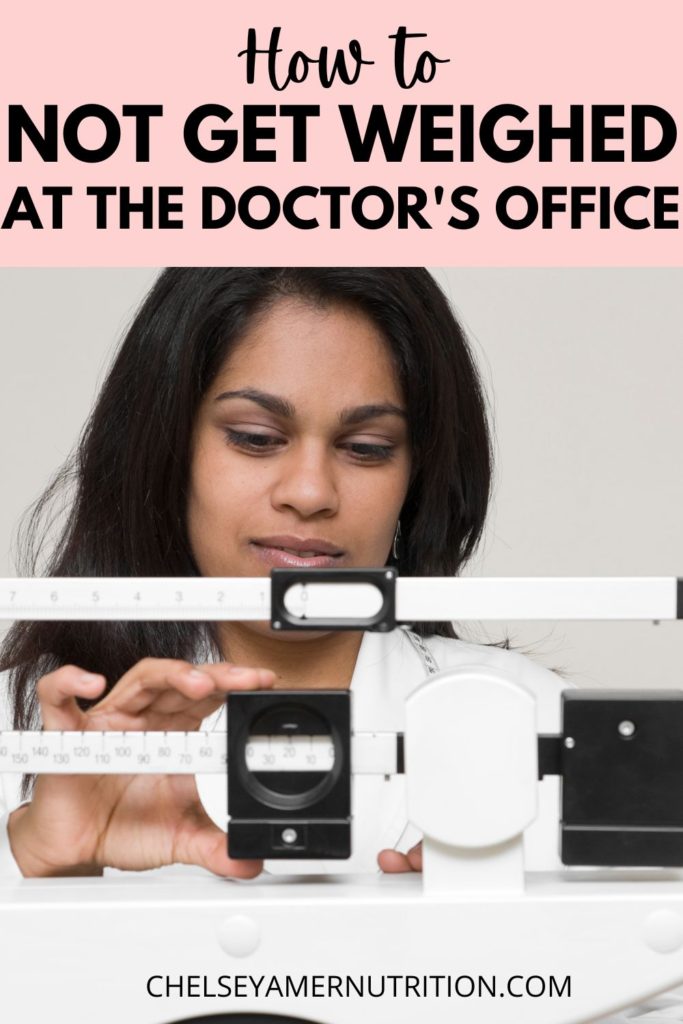How to NOT Get Weighed at the Doctor’s Office
Did you know that you do not have to get weighed at the doctor’s office? In this blog post I’m breaking down the ins and outs of why you get weighed at the doctor and what to expect.

I have an admission… this morning is my first physical in YEARS… like over 8 years (at least).
Between having chronic lung disease and constantly seeing specialists for a few years, then being on and off pregnant for the last 4 years, plus covid and moving, I haven’t had a proper full physical with a primary care doctor. *wish me luck at my new MD!*
As you could imagine, this is not recommended.
The reasons I’ve put off seeing a doctor, however, may be different than yours.
Many of my clients don’t like seeing their doctor for routine check-ups for fear of what may be said about their weight.
The medical system hasn’t fully caught on that weight does NOT equal health.
Your HABITS = health.
As such, you do NOT have to be weighed at the doctor’s office.
I’ve heard from SO many clients that doctors blame weight for any and every ailment. That’s just something that thin-bodied people don’t experience.
As such, if you’re worried about what a doctor may say about your weight, you’re less likely to go to the doctor and get the care you need.
That leads to more advanced diagnoses, more medication needed, and more expensive interventions… some of which could’ve been prevented with earlier care.
Since I’m headed to the doctor this morning, I wanted to remind you of a few things…
1. You do NOT have to be weighed at the doctor
There are some exceptions (see my next point), but your weight is just ONE data point. It’s not the full picture of your current health status. As such, it’s really not all that necessary.
As a patient, you can decline being weighed.
Here’s how to NOT get weighed at the doctor’s office…
It’s hard to interrupt a routine – you get into the room, are asked to put down your things, hang up your jacket, and are expected to get on the scale. However, you can rewrite this story loop.
If you feel comfortable, on your walk from the waiting room to the exam room you can tell the medical assistant, “I don’t want to get weighed, could you make a note in my chart?”
Alternatively, if you want to explain yourself a bit you could say: “I have a triggering relationship with the scale so I’d prefer not to be weighed today. Thanks for understanding.” *end conversation*
Not all medical assistants will be familiar with this request, so they may respond that they need to check with your physician. If you get a ton of pushback, it may be time to find a new provider who focuses more on inclusive care.
2. You can request a “blind weight”
There are some reasons your doctor likes to track your weight…
- Medications
- Recent drastic weight gain/loss
- Water fluctuations/fluid retention (i.e. in kidney disease or heart failure)
- Pregnancy (although not 100% necessary, truly)
- Eating disorder treatment
If your doctor insists that knowing your weight is necessary for your medical care, you still do not need to know your weight.
A “blind weight” is when you’re weighed without seeing the number. Either you look away, you’re weighed backwards… whatever the means, the number is kept from you.
Don’t assume every nurse/MD/PA knows that you want your weight kept out of the conversation though, so be sure to reiterate to each new medical team member that you don’t want to discuss your weight.
3. Advocate for yourself + protect your peace
You don’t have to discuss your body size. You’re allowed to decline a conversation or push back on your physician if they want to harp on your body size.
A doctor should never comment on your weight without *at least* also having your bloodwork, blood pressure, medications, and a discussion about your daily habits and mental health with you.
If you’ve recently gained weight and a doctor comments on weight gain since your last appointment, for example, they should also ask about what you were doing when you were a lower weight and what may have changed. Many people were participating in unhealthy, disordered-type of behaviors to maintain a lower body weight that just isn’t possible long term.
We cannot assume that thin = healthy the same way we cannot assume fat = unhealthy.
I know this is a hard concept to grasp, but your ACTIONS matter more than a single data point.
Focus on those actions in order to make improvements in your health.
If you’re looking for support on your health journey, apply to work with us!
XO


 Hi there!
Thanks for stopping by! I'm Chelsey, an online Registered Dietitian, recipe developer, budding photographer, and coffee addict! My mission is to help you feel good through food by answering the question "What should I eat?" Let's make nutrition approachable!
I hope you enjoy my personal collection of simple, healthy, food allergy friendly and nutritiously delicious recipes, plus tips and tons of tricks that will help YOU live a nutritionally-balanced life! I look forward to getting to know you better...
Hi there!
Thanks for stopping by! I'm Chelsey, an online Registered Dietitian, recipe developer, budding photographer, and coffee addict! My mission is to help you feel good through food by answering the question "What should I eat?" Let's make nutrition approachable!
I hope you enjoy my personal collection of simple, healthy, food allergy friendly and nutritiously delicious recipes, plus tips and tons of tricks that will help YOU live a nutritionally-balanced life! I look forward to getting to know you better...







